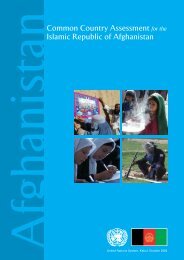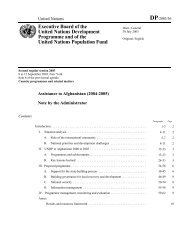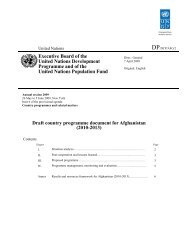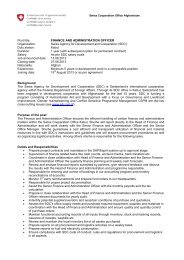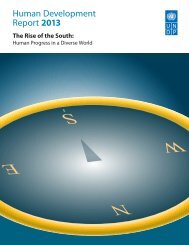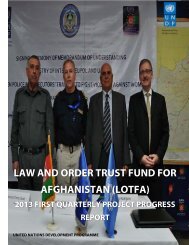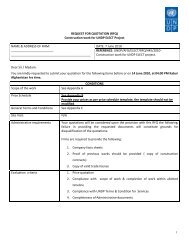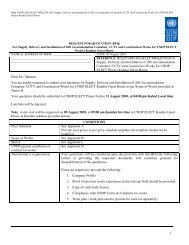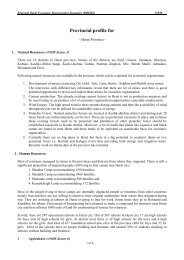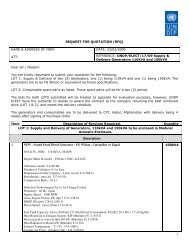Final Report of SEAL I - UNDP Afghanistan
Final Report of SEAL I - UNDP Afghanistan
Final Report of SEAL I - UNDP Afghanistan
You also want an ePaper? Increase the reach of your titles
YUMPU automatically turns print PDFs into web optimized ePapers that Google loves.
Support to the Establishment <strong>of</strong> Afghan Legislature<br />
Project ID 00043513<br />
16<br />
MPs were better informed <strong>of</strong> the United Nations Millennium Development Goals (MDG) and how<br />
they apply to Afghan development following a <strong>SEAL</strong> supported delegation to a United Nations<br />
conference on MDGs in Thailand. MPs learned the responsibilities <strong>of</strong> parliaments in overseeing the<br />
implementation <strong>of</strong> MDGs.<br />
Improving the capacity <strong>of</strong> the committees, <strong>SEAL</strong> sponsored a two week training course for 12<br />
Committee Assistants to the French Parliament in 2007. Topics covered in the training included:<br />
drafting a member’s bill; incorporating amendments in a draft bill; reporting to the president; the<br />
legislative role <strong>of</strong> the commission in the law-making process; familiarization with the rules <strong>of</strong><br />
Procedure; conducting a commission meeting; and dealing with the public. Following this<br />
training, 64 Committee Assistants received similar in-country training by an expert consultant<br />
provided by <strong>SEAL</strong>. Committee Assistants now better understand their roles and responsibilities,<br />
and are more skilled in report writing. Committee assistants can provide notably improved<br />
administrative services, including substantive support to the day-to-day tasks <strong>of</strong> their respective<br />
commission members.<br />
<strong>SEAL</strong> also supported delegations from <strong>Afghanistan</strong> to the NATO Parliamentary Assembly in<br />
Iceland and the Inter-Parliamentary Assembly <strong>of</strong> the CIS Member Nations in Moscow.<br />
FINANCE and ADMINISTRATION<br />
<strong>SEAL</strong>’s work in 2007 with Parliament’s Finance, Administration, ICT and HR Departments has<br />
greatly reduced duplication and errors, and has increased the speed and accountability with<br />
which transactions are processed. This work has contributed to the operational capacity and<br />
efficiency <strong>of</strong> the Parliament secretariat.<br />
Because <strong>of</strong> the integrated nature <strong>of</strong> the work involved in the modernization <strong>of</strong> the secretariat<br />
function, active participation from various departments and groups at staff and management<br />
levels was <strong>of</strong> prime importance. Because the new systems affected the way people work, many <strong>of</strong><br />
these initiatives were achieved successfully by the formation <strong>of</strong> working groups.<br />
In early 2007, <strong>SEAL</strong> completed a thorough study and documentation <strong>of</strong> the current workflow<br />
processes in the Finance and Administration Departments <strong>of</strong> the Houses. The study produced<br />
thirteen major recommendations for progressive implementation. The recommendations were<br />
rolled into <strong>SEAL</strong>’s capacity building work, focusing on the implementation <strong>of</strong> the computerized<br />
payroll system, banking system, information management system, cash management system, and<br />
training programmes.<br />
COMPUTERIZED PAYROLL SYSTEM:<br />
After six months <strong>of</strong> data computerization, validation, training and customization <strong>of</strong> s<strong>of</strong>tware, a<br />
computerized payroll system for more than 300 staff members was inaugurated for the Upper<br />
House. The initiative has subsequently been extended to cover the more than 600 staff members<br />
<strong>of</strong> the Lower House.<br />
Several constraints delayed the implementation <strong>of</strong> the computerized payroll system. Errors in data<br />
entry and data loss at the Ministry <strong>of</strong> Finance required validation workshops and re-registration<br />
activities, delaying implementation. Additionally, limited availability <strong>of</strong> members <strong>of</strong> the<br />
interdisciplinary working group from the Parliament delayed completion <strong>of</strong> the programme.<br />
Implementation <strong>of</strong> the payroll for Lower House was delayed due to difficulty in identifying<br />
appropriate s<strong>of</strong>tware to accommodate the payroll for the security staff.<br />
BANKING SYSTEM:<br />
In 2007, staff <strong>of</strong> the Upper House began receiving their salaries through the bank for the first time.<br />
The computerized payroll system is linked with a banking system and on-site banking facility.<br />
<strong>SEAL</strong> has negotiated and facilitated an agreement between the partner bank and the Parliament<br />
to build a dedicated and fully operational bank on the premises.<br />
INFORMATION MANAGEMENT SYSTEM:<br />
<strong>Final</strong> Project Progress <strong>Report</strong> |



